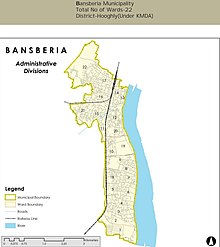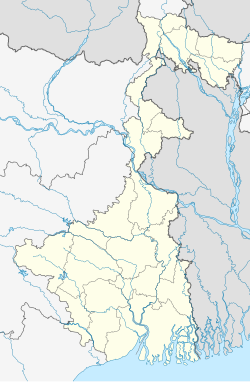Bansberia
Bansberia | |
|---|---|
| Bansh Baria(Railway Name) | |
|
Clockwise from top: Hanseswari Devi Idol and | |
| Nicknames: বাঁশবেড়িয়া বংশবাটী | |
 Bansberia Municipality Area Map | |
| Coordinates: 22°58′N 88°24′E / 22.97°N 88.40°E | |
| Country | |
| State | West Bengal |
| Division | Burdwan |
| District | Hooghly |
| Established | 1869 |
| Founded by | Raja Narasingha Dev |
| Government | |
| • Type | Municipality |
| • Body | Bansberia Municipality |
| • Chairman/Commissioner • Vice Chairperson | Aditya Neogi (AITC) • Silipi Chatterjee (AITC) |
| Area | |
• Total | 9.07 km2 (3.50 sq mi) |
| • Rank | 5th (in Hooghly District) |
| Elevation | 6 m (20 ft) |
| Population (2011) | |
• Total | 103,799 |
| • Density | 11,000/km2 (30,000/sq mi) |
| Languages | |
| • Official | Bengali, English |
| Time zone | UTC+5:30 (IST) |
| PIN | 712502, 712104, 712503 |
| Telephone code | +91 33 |
| Vehicle registration | WB16 |
| Lok Sabha constituency | Hooghly |
| Member of Parliament | Rachana Banerjee (AITC) |
| Vidhan Sabha constituency | Saptagram |
| M.L.A | Tapan D.Gupta (AITC) |
Bansberia is a city and a municipality of Hooghly district in the Indian state of West Bengal. It is about 45 km (28 mi) away from Kolkata, at the western end of the Iswar Gupta Setu (Kalyani-Bansberia) Bridge. It is a part of the area covered by Kolkata Metropolitan Development Authority (KMDA).[1] Bans Beria railway station is 4 km from Bandel Junction on the Bandel-Katwa Line.The area covered by two police stations - Chinsurah (W.no.1-4) and Mogra (W.no.5-22). The part of both police stations governed by Chandannagar Police Commissionerate. Kartik Puja is the famous festival of Bansberia. Bansberia also famous for its Kumbh Mela.
History
[edit]

Bansberia was one of the main city of ancient Saptagram.[2]
Zafar Khan Ghazi Mosque and Dargah situated at Tribeni in Hooghly district, West Bengal, India, are considered to be among the earliest surviving Muslim monuments in Bengal.[3] According to an inscription, the mosque is dated 698 AH (1298 AD).[citation needed] Tribeni (junction of three rivers viz, the Ganges, the Yamuna, and the Sarasvati - hence the name) was an ancient holy place of the Hindus.[citation needed] The Muslims conquered it during the early phase of their conquest of Bengal.[citation needed] The mosque is an oblong structure measuring 23.38 by 10.53 metres (76.7 by 34.5 ft) externally. It is the earliest surviving example of the brick-and-stone style introduced by the Muslims in Bengal in place of the traditional Hindu style of laying rectangular cut stones one upon another without mortar.[citation needed] The stones used in the mosque were originally materials from temples, as evidenced by figures of Hindu deities carved on some pieces.[citation needed] The original structure has suffered reconstruction a number of times.[citation needed]
Geography
[edit]
5miles
River
M: municipal city/ town, CT: census town, R: rural/ urban centre,
Owing to space constraints in the small map, the actual locations in a larger map may vary slightly
Location
[edit]Bansberia is located at 22°58′N 88°24′E / 22.97°N 88.40°E.[4]
The area is composed of flat alluvial plains that forms part of the Gangetic Delta. The high west bank of the tidal Hooghly River is highly industrialised.[5]
Hansghara, Kola, Alikhoja, Amodghata, Shankhanagar and Chak Bansberia form a cluster of census towns on the eastern side of Bansberia and includes Mogra and Bara Khejuria (outgrowth).[4]

Urbanisation
[edit]There are 13 statutory towns and 64 census towns in Hooghly district. The right bank of the Hooghly River has been industrialised over a long period. With foreigners dominating the area's industry, trade and commerce for over two centuries, it is amongst the leading industrialised districts in the state. At the same time the land is fertile and agricultural production is significant.[6]
In Chinsurah subdivision 68.63% of the population is rural and the urban population is 31.37%. It has 2 statutory and 23 census towns.[7] In Chinsurah Mogra CD Block 64.87% of the population is urban and 35.13% is rural. Amongst the four remaining CD Blocks in the subdivision two were overwhelmingly rural and two were wholly rural.[8]
The map alongside shows a portion of Chinsurah subdivision. All places marked in the map are linked in the larger full screen map.
Demographics
[edit]| Year | Pop. | ±% |
|---|---|---|
| 1901 | 6,473 | — |
| 1911 | 6,108 | −5.6% |
| 1921 | 6,382 | +4.5% |
| 1931 | 14,221 | +122.8% |
| 1941 | 23,716 | +66.8% |
| 1951 | 30,622 | +29.1% |
| 1961 | 45,463 | +48.5% |
| 1971 | 61,748 | +35.8% |
| 1981 | 88,581 | +43.5% |
| 1991 | 96,500 | +8.9% |
| 2001 | 107,081 | +11.0% |
| 2011 | 103,920 | −3.0% |
| Source: Government of India[9] | ||
As per 2011 Census of India Bansberia had a total population of 103,799 of which 53,760 (52%) were males and 50,160 (48%) were females. Population below 6 years was 9,502. The total number of literates in Bansberia was 80,301 (85.05% of the population over 6 years).[10]
Languages
[edit]The following Municipalities and Census Towns in Hooghly district were part of Kolkata Urban Agglomeration in 2011 census: Bansberia (M), Hugli-Chinsurah (M), Bara Khejuria (Out Growth), Shankhanagar (CT), Amodghata (CT), Chak Bansberia (CT), Naldanga (CT), Kodalia (CT), Kulihanda (CT), Simla (CT), Dharmapur (CT), Bhadreswar (M), Champdani (M), Chandannagar (M Corp.), Baidyabati (M), Serampore (M), Rishra (M), Rishra (CT), Bamunari (CT), Dakshin Rajyadharpur (CT), Nabagram Colony (CT), Konnagar (M), Uttarpara Kotrung (M), Raghunathpur (PS-Dankuni) (CT), Kanaipur (CT) and Keota (CT).[12]
As of 2001[update] India census,[13] Bansberia had a population of 104,453. Males constitute 53% of the population and females 47%. Bansberia has an average literacy rate of 71%, higher than the national average of 59.5%; with 58% of the literates being males and 42% of being females. 10% of the population is under 6 years of age.
Transport
[edit]Bans Beria railway station is the main railway connection of the town. This station is well connected Howrah and Bandel. This is the greeny and clean railway station of West Bengal. Howrah - Katwa local, Bandel - Katwa local, Sealdah - Katwa local(a pair train in a day), Sealdah - Jangipur road passenger(except Sunday), Howrah - Azimganj express, Howrah - Katihar express stop Bansberia every day. Three platform are situated in Bansberia station. 4,000 (approx) people used this station for daily.
State Highway 6/ STKK Road passes through Bansberia. Private Bus Route no. 39 (Chunchura Court-Jirat) runs through here.[14] Other modes of transport are: Tribeni-Chinsurah Auto-rickshaw route, Tribeni-Bandel railway station Tata Magic Van route, Dunlop Ferry Ghat-Kuntighat railway station Auto-rickshaw route, Tribeni railway station-Hooghly railway station Auto-rickshaw route etc. Besides, battery operated TOTO (E-rickshaw) also runs in Bansberia.
Bansberia is connected to Kalyani with Ishwar Gupta Setu along Kalyani Expressway across Bhagirathi-Hooghly River.
Culture
[edit]Kartik Puja festival
[edit]In Katwa (East Burdwan District) and Bansberia (Hooghly District), Kartik Puja festival is celebrated like Durga puja of Kolkata, Jagadhatri puja in Chandannagar for consecutive four days. The festival starts on 17 November every year or on 16 November in case of a leap year.[citation needed]
See also
[edit]References
[edit]- ^ "Base Map of Kolkata Metropolitan area". Kolkata Metropolitan Development Authority. Archived from the original on 28 September 2007. Retrieved 3 September 2007.
- ^ West Bengal Tourism – see Hooghly Archived 27 January 2007 at the Wayback Machine
- ^ unesdoc.unesco.org https://unesdoc.unesco.org/ark:/48223/pf0000158361. Retrieved 29 June 2024.
{{cite web}}: Missing or empty|title=(help) - ^ a b "Census of India 2011, West Bengal: District Census Handbook, Hooghly" (PDF). Map of Chinsurah-Magra CD Block, page 469. Directorate of Census Operations, West Bengal. Retrieved 26 September 2018.
- ^ "District Census Handbook: Hugli, Series-20, Part XIIA" (PDF). Physiography, Page 17-24. Directorate of Census Operations, West Bengal, 2011. Retrieved 28 September 2018.
- ^ "District Census Handbook: Hugli, Series-20, Part XIIA" (PDF). Physical features: pages 20, 24. Directorate of Census Operations, West Bengal, 2011. Retrieved 27 September 2018.
- ^ "District Statistical Handbook 2014 Hooghly". Table 2.1, 2.2, 2.4(a). Department of Statistics and Programme Implementation, Government of West Bengal. Archived from the original on 21 January 2019. Retrieved 27 September 2018.
- ^ "C.D. Block Wise Primary Census Abstract Data(PCA)". 2011 census: West Bengal – District-wise CD Blocks. Registrar General and Census Commissioner, India. Retrieved 27 September 2018.
- ^ "Census Tables". censusindia.gov.in. Retrieved 6 January 2024.
- ^ "2011 Census – Primary Census Abstract Data Tables". West Bengal – District-wise. Registrar General and Census Commissioner, India. Retrieved 15 June 2016.
- ^ 2011 census data censusindia.gov.in
- ^ "Provisional Population Totals, Census of India 2011" (PDF). Constituents of Urban Agglomeration Having Population Above 1 Lakh. Census of India 2011. Retrieved 16 June 2016.
- ^ "Census of India 2001: Data from the 2001 Census, including cities, villages and towns (Provisional)". Census Commission of India. Archived from the original on 16 June 2004. Retrieved 1 November 2008.
- ^ "List of State Highways in West Bengal". West Bengal Traffic Police. Retrieved 15 October 2016.




